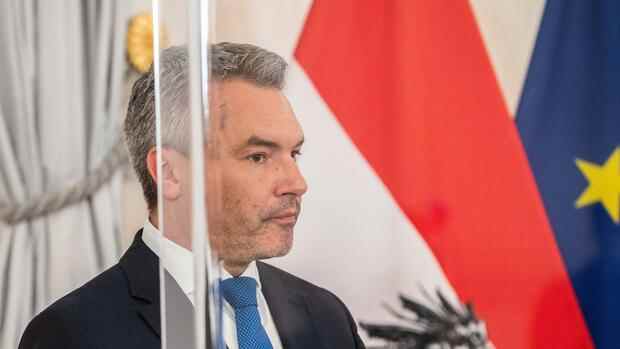At 3 p.m. the time had come – and about 60 minutes later the conversation was over. Nehammer did not comment orally on this. A statement from the Federal Chancellery only said that the talks with Putin were “very direct, open and tough”. “I addressed the serious war crimes in Bucha and other places and emphasized that everyone responsible for them must be held accountable,” the Chancellor was quoted as saying in a document that was presumably largely written before the talks was.
Nehammer then also emphasized that the sanctions against Russia would remain in place and would be tightened further as long as people died in Ukraine. The politician also called for so-called humanitarian corridors to bring drinking water and food to the besieged cities. “But my most important message to Putin was that this war must finally end.” Nehammer now wants to inform the European partners about the talks. Putin did not react.
On Sunday afternoon, the Austrian Chancellor surprisingly announced that he wanted to meet Putin. “The initiative came from me,” said the politician. He had informed EU Commission President Ursula von der Leyen and the EU’s foreign policy representative Josep Borrell of his plans.
Top jobs of the day
Find the best jobs now and
be notified by email.
The German Chancellor Olaf Scholz and Volodimir Zelenski, the President of Ukraine, were also informed. Apparently these politicians had nothing fundamental to object to Nehammer’s visit to Moscow. A German government spokeswoman said on Monday that the Austrian Chancellor’s initiative was welcomed. Scholz, on the other hand, is not currently planning a trip to Moscow.
No truce and no escape routes
Before the visit, Austria’s chancellor had set himself ambitious goals for his mission. These included a ceasefire and the establishment of escape routes for war-affected Ukrainians.
>> Read also: Security expert expects a long conflict: “Russia will try to force Ukraine in the east into a war of attrition”
Similar efforts have been made since the outbreak of war. So far, however, Russia has never responded to the demands for a ceasefire. There has also often been talk of setting up escape corridors, for example from the besieged city of Mariupol. Ultimately, however, there were repeatedly no safe escape routes.
The reactions on Sunday in Austria were mixed. Vice Chancellor Werner Kogler from the Green Party said: “Provided that the trip within the European Union is coordinated, it could be worth a try.” Nehammer himself said on Sunday: “It’s a risk mission, I want that don’t deny it at all.”
The criticism of the trip was partly pointed out in science. “I don’t think this visit is a wise decision,” said political scientist Gerhard Mangott from the University of Innsbruck on Austrian television ORF. Nehammer runs the risk that his visit will be misused by Russian propaganda.
>> Read also: “There is capacity”: How quickly Europe could replace Russian gas
Mangott also spoke of Austria’s role as a mediator, which the country prides itself on. It worked above all during the Cold War before 1980. However, Mangott doubted whether Austria would still be able to function as a bridge builder today. In Russia they know that the small country no longer has any weight in the EU, he said. “It is difficult to understand what the Chancellor expects.”
In particular, the timing of the visit can be seen as delicate. Russia is probably preparing a military offensive in the Donbass. Complete conquest of this region appears to be Putin’s new war goal after his plan to install a puppet government in Kyiv fell through.
Nehammer does not want to join the embargo against Russia
However, this is not the first time that Austria has gone its own way in the Ukraine war. The governments of Sweden and Finland are seriously discussing whether their countries should join NATO. Such a step is currently not on the agenda in Austria. “Austria was neutral, is neutral and will remain neutral in the future,” wrote the Chancellor on Twitter in March.
At the same time, the country has so far vehemently opposed an embargo on Russian gas for economic reasons. After all, around 80 percent of the gas used in Austria comes from Russia.
LPG is currently not an alternative for the country. Nehammer also made a pilgrimage to Qatar in March with a small retinue of politicians and business leaders to explore the possibility of buying liquid gas. However, Austria will not receive large quantities from there until further notice.
More: Chronology of events: why does Putin want Ukraine?
